Hip-hop’s game-changing moments
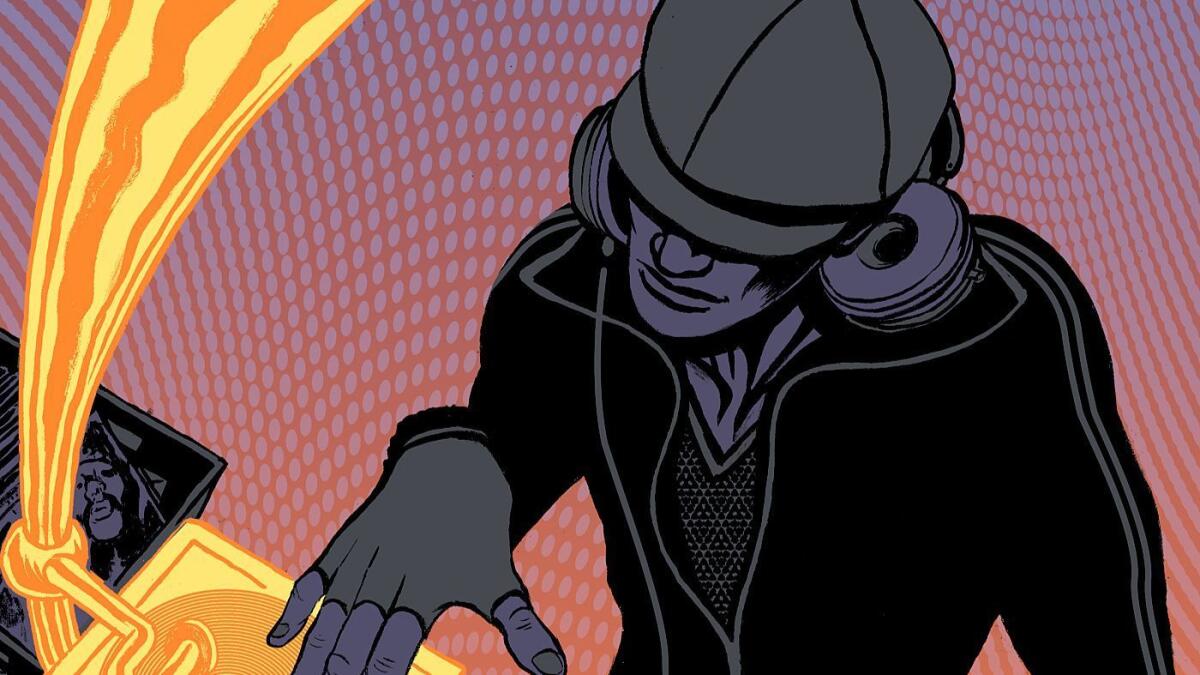
- Share via
While this year’s Grammy nominations reflect the cultural dominance of hip-hop — in 2017 R&B/hip-hop proved to be the most consumed music in the U.S for the first time in history, according to Nielsen Music — such a shift shouldn’t have caught anyone by surprise. The genre has been a force for numerous decades, and here we reflect on some of hip-hop culture’s most monumental crossover moments.
1980
The Invention of the Roland 808
Kanye West didn’t call the album “Generic Sample Pack of Hip Hop Drum Loops & Heartbreak” for a reason. Ikutaro Kakehashi’s 1980 creation of a programmable drum machine for Roland was initially a bust because many musicians didn’t think it sounded human. Then dance music and hip-hop got hold of it, and rappers found that its distinctly icy, artificial clamor was the perfect backdrop for samples and heavy mic work. Its sound and spirit have since made it onto pretty much every popular hip-hop (and otherwise) album since.
1982
‘Wild Style’ hits the theaters
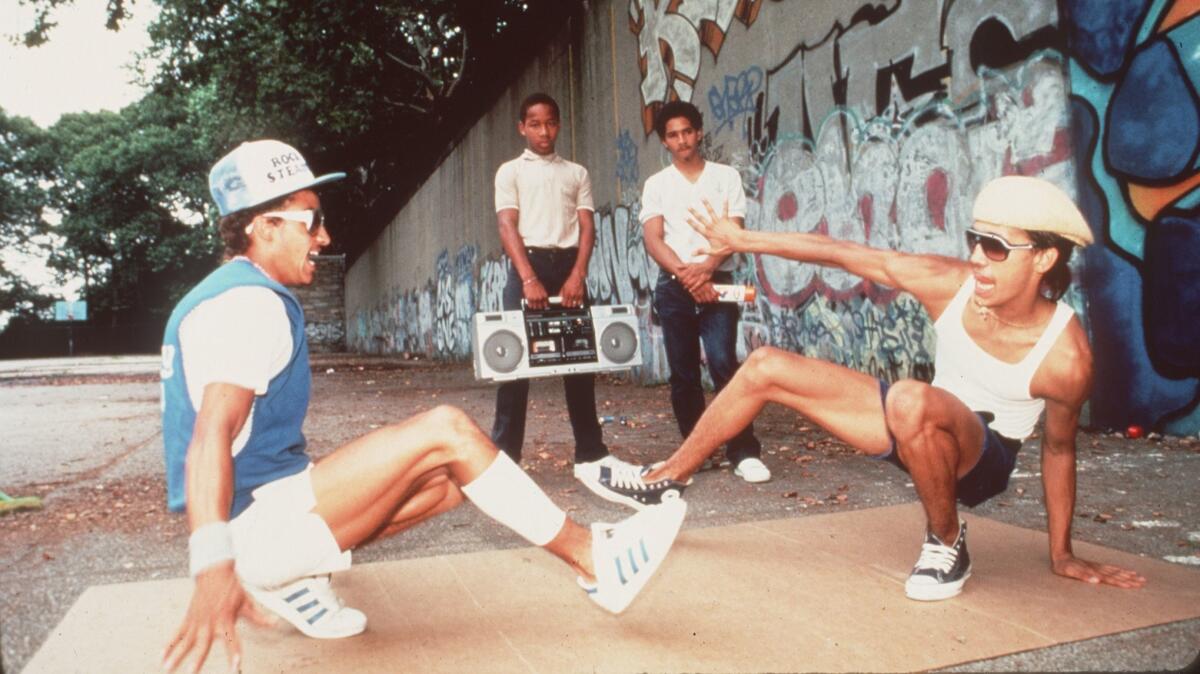
Considered the first film to focus on the rap movement, this Charlie Ahearn-directed feature documents the early Bronx pioneers who turned a neighborhood scene into a worldwide phenomena. Featuring artists and personalities including Fab 5 Freddy, Grandmaster Flash, the Cold Crush Brothers and more, “Wild Style” helped introduce to the masses the so-called four pillars of hip-hop culture: rapping, DJing, break dancing and graffiti art.
July 1986
Rap-rock goes mainstream
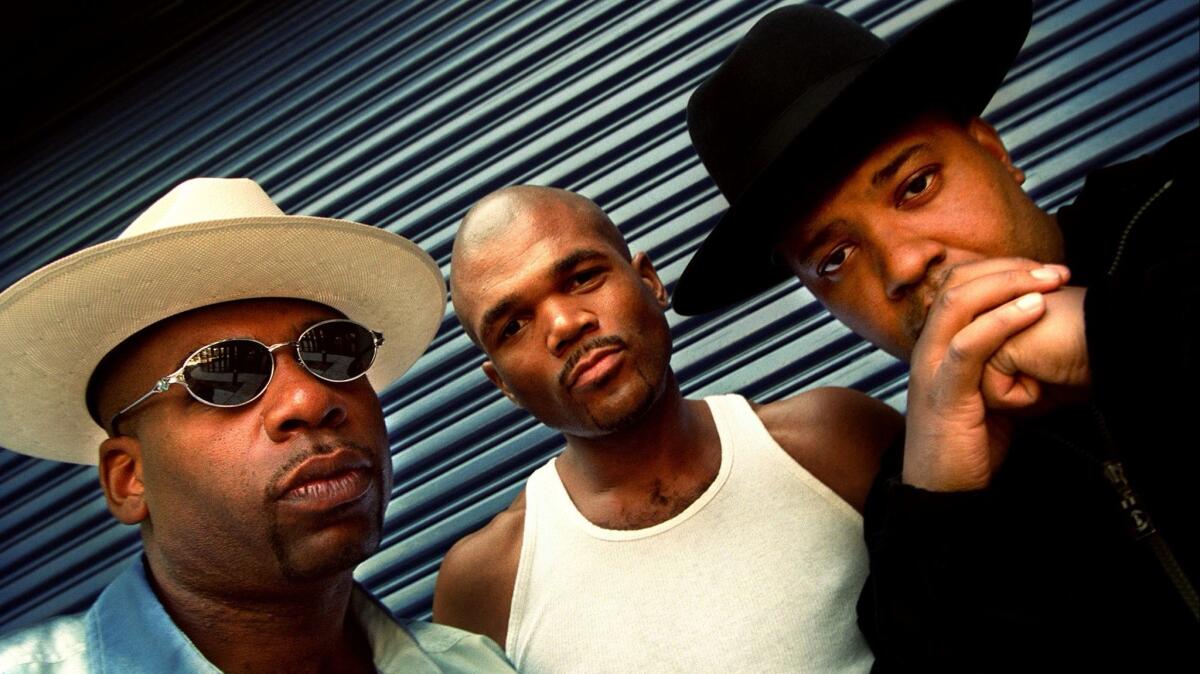
Run-DMC didn’t invent rap-rock with its hit cover of Aerosmith’s “Walk This Way.” LL Cool J, for one, had previously paired his rhymes with crunching electric guitar in 1985’s “Rock the Bells.” But there’s no doubt that “Walk This Way” — accompanied by an iconic music video in which the two acts literally break down a wall — introduced hip-hop to wary listeners reassured by the song’s familiar riff. And because it revived Aerosmith’s career, “Walk This Way” helped inspire rockers like the Doors and King Crimson to allow their music to be sampled too.
JANUARY 1987
The Grammys tentatively acknowledge hip-hop
In early 1987 the Recording Academy recognized hip-hop trio Run-DMC with a nomination for its breakthrough album, “Raising Hell.” However, with rap seen as a passing fad, the group competed in an R&B category. It would be another few years before the genre received its own award. When the first rap Grammy was handed out in 1989 -- a decade after the genre’s birth -- nominees Salt-N-Pepa, DJ Jazzy Jeff & the Fresh Prince, LL Cool J and Kool Moe Dee boycotted because the award wouldn’t be given out on-air. “If they don’t want us, we don’t want them,” Salt-N-Pepa said.
1988
Birth of gangsta rap
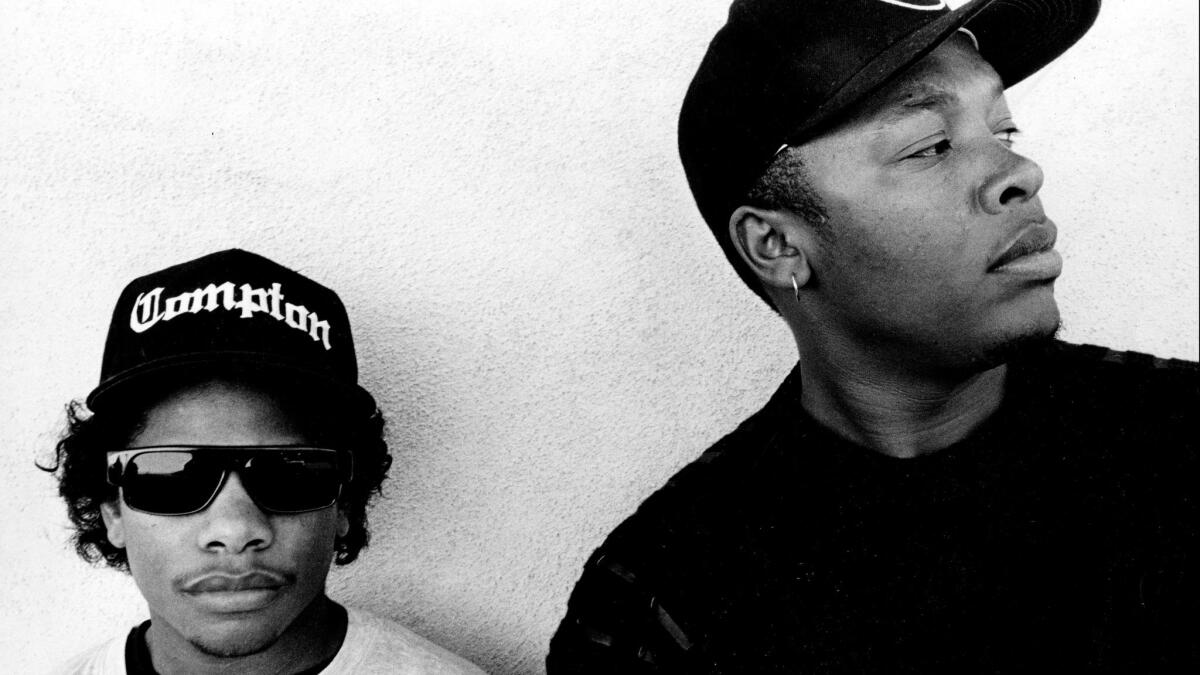
Hip-hop has seen many innovations over its four decades, but nothing altered its sound more than West Coast gangsta rap. South Central Los Angeles was an epicenter of a harder, rawer brand of rap and, in turn, established the West Coast as a force in rap. DJ Toddy Tee, Ice-T, Eazy-E and his N.W.A crew were some of the genre’s forebears. When gangsta rap wasn’t drawing the ire of conservatives and politicians, it was breeding emcees such as Ice Cube, Dr. Dre, Snoop Dogg, Too Short, Tupac Shakur and the Notorious B.I.G. Without its advent, one wonders where talents such as Kendrick Lamar, the Game and Eminem would have gleaned inspiration.
August 1988
The debut of ‘Yo! MTV Raps’
For all its posturing as the voice of a generation, MTV’s early days were marked by the network’s slow embrace of black artists, particularly those who rapped. In fact, during MTV’s first 18 months on the air, fewer than two dozen videos featured black artists. It was enough for David Bowie to call MTV out on-air. By 1988, the explosion of gangsta rap made hip-hop too loud to ignore and that year the network aired the pilot for “Yo! MTV Raps.”
JULY 1989
Beastie Boys unleashes the groundbreaking ‘Paul’s Boutique’
Can music be made with nothing but pieces of other music? If yes, what’s a fair price for the rights to do so? Those were the questions behind the debates and lawsuits around the Beastie Boys’ 1989 LP “Paul’s Boutique,” a brilliant hip-hop album that used so many popular samples (cleared at such cut-rate prices) that artists finally took notice that this needed be resolved -- especially if hip-hop was making good money from this then-novel practice. This album started the conversation that determined that the backbone of hip-hop production was not just a viable practice but an art.
JULY 1989
Spike Lee’s ‘Do the Right Thing’ opens in theaters
Few opening credits have set a movie’s tone as Public Enemy’s “Fight the Power” did in Spike Lee’s film. Brash and undeniably potent, its use in the film about racial tensions in Brooklyn felt like a sonic Molotov cocktail when, in the summer of ’89, it blew out of massive movie speakers. Not only did the first four minutes feature a young Rosie Perez dancing through the entirety of the track and credits, the song’s production hit with a wall-of-sound rush that confirmed untapped possibilities of beat production.
SEPTEMBER 1990
‘The Fresh Prince of Bel-Air’ premieres
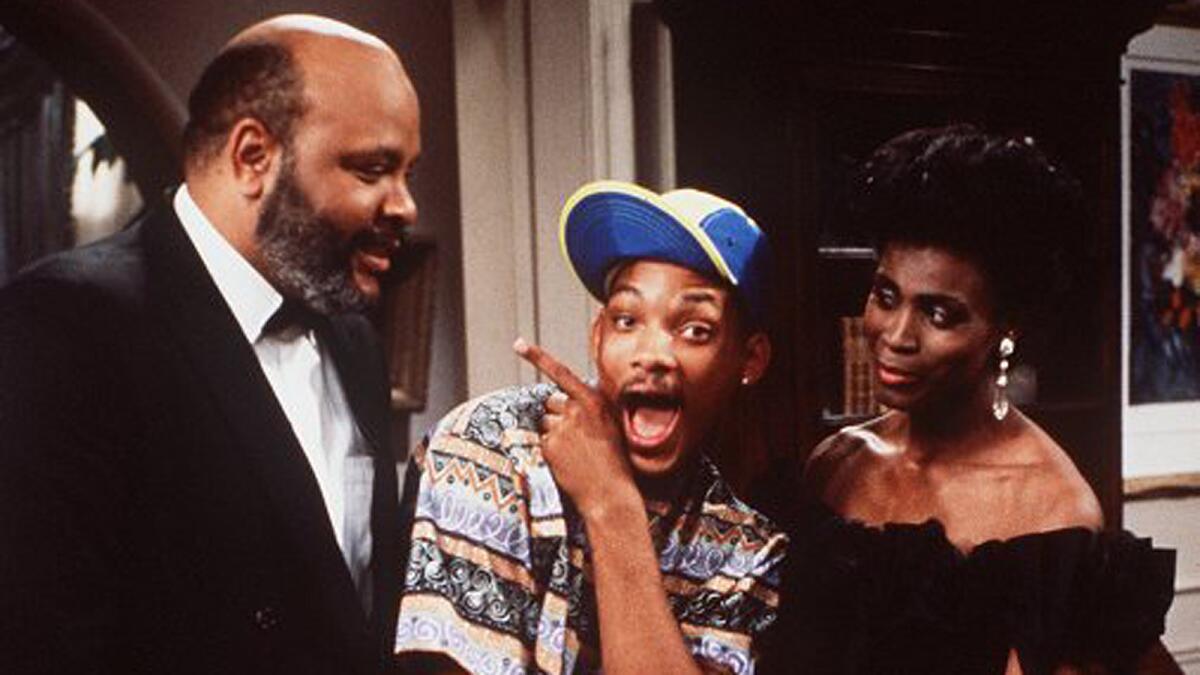
A fish out of water family sitcom about a rap-loving teen from tough West Philadelphia living with well-heeled relatives in Bel-Air? Silly, yes, but NBC’s “The Fresh Prince of Bel-Air” was an instant game changer. Topped by Will Smith — back when he was best known as half of bright rap duo DJ Jazzy Jeff & the Fresh Prince (the pair won the first rap Grammy in 1989, by the way) – the series won over America while exploring race, class and gender politics with an irreverent, hip-hop edge.
JULY 1991
‘Boyz n the Hood’ ushers in a new era of film
Set in ’80s-era South-Central Los Angeles, “Boyz n the Hood” (named after Eazy-E’s infamous single) is the directorial and screenwriting debut of John Singleton. The gritty film – starring Cuba Gooding Jr., Laurence Fishburne, Angela Bassett and Ice Cube – humanized the harsh lives of a group of youngsters growing up amid the nihilistic lives explored in gangsta rap. Singleton became the youngest person (and the first African American) to get an Academy Award nomination for directing and the film’s success birthed an entire sub-genre of films informed by life in the inner city.
June 1992
Bill Clinton’s Sister Souljah moment
Following the 1992 L.A. riots, rapper and activist Sister Souljah positioned the unrest as “revenge” against years of white oppression. An edited version of the quote made its way to Arkansas Gov. and presidential candidate Bill Clinton, who, seeking appeal beyond the Democratic vote, denounced her publicly at the Rev. Jesse Jackson’s Rainbow Coalition Leadership Summit. His vilification, based on a quote taken out of context, angered Jackson and other black leaders who accused Clinton of exploiting Souljah “purely to appeal to conservative whites.” It was an embarrassing hiccup for Clinton, who later earned the nickname of America’s “first black president” after the use of the phrase by author Toni Morrison.
1995
The rise of Cash Money, No Limit and Southern rap
Until the renegade Louisiana imprints moved from the Southern club circuit and onto American streets, rap was considered a bicoastal concern whose major players were either in New York or Los Angeles. The bass-heavy bounce sound rumbling through the bottom of the country changed that. Rappers and shouters including Masta P, Mystikal, Juvenile, Big Tymers and Hot Boyz — featuring a 15-year-old Lil Wayne — confirmed to the masses that scenes could flourish outside the biggest cities.
FEBRUARY 1999
‘The Miseducation of Lauryn Hill’ wins album of the year Grammy
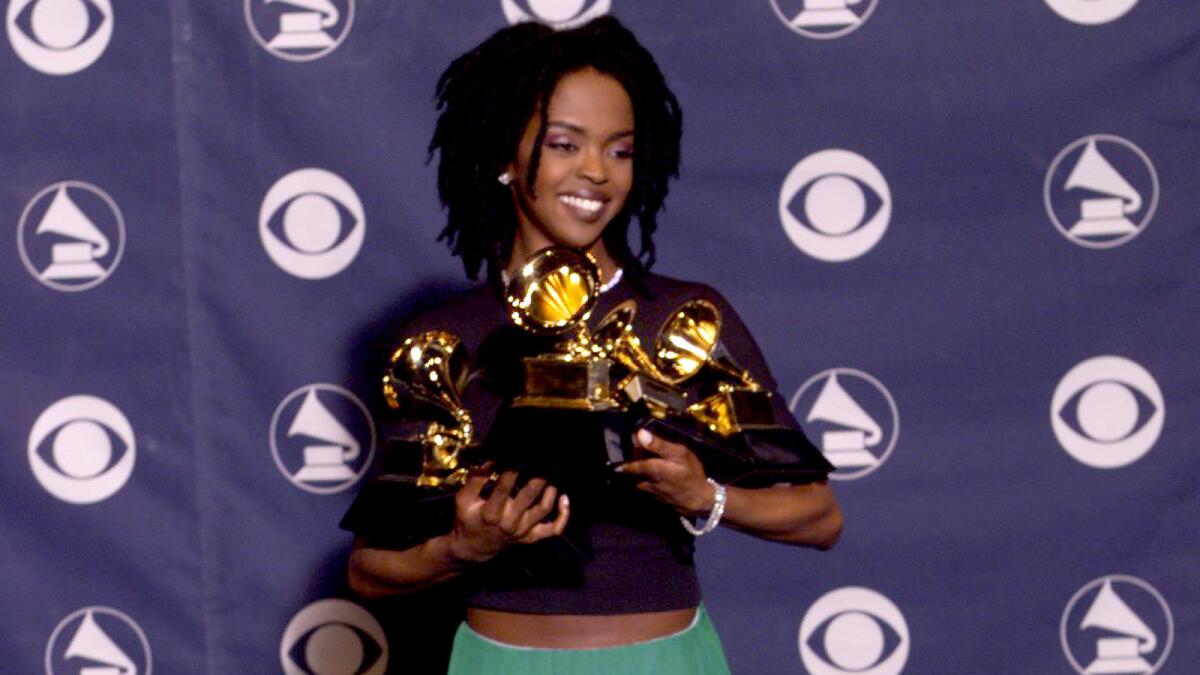
Not only is it one of the most accomplished debuts in pop history, the former Fugees member Hill’s solo album was the first rap record, male or female, to earn the coveted album of the year Grammy. Besting a female-dominant field that included Madonna, Sheryl Crow, Garbage and Shania Twain, the New Jersey-born Hill proved the music’s malleability not only as an art form but as a commercial force.
NOVEMBER 2002
Eminem goes Hollywood
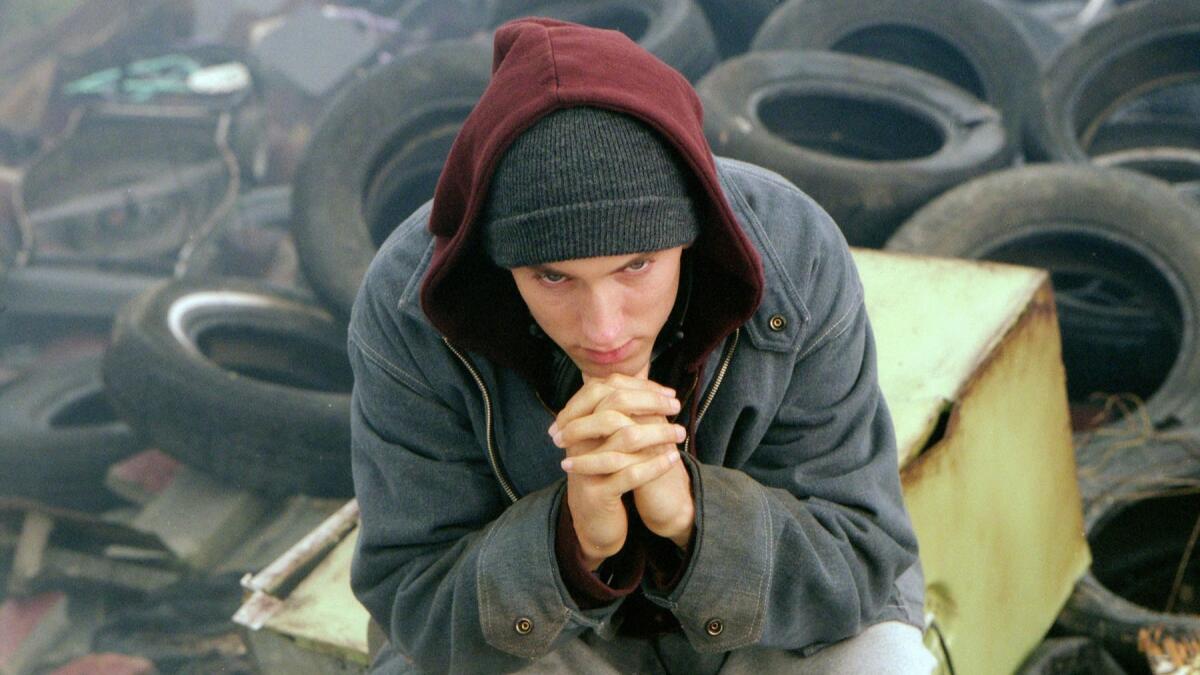
Eminem brought hip-hop — and an approximate version of his life story — to the big screen with his starring role in Curtis Hanson’s “8 Mile,” which follows a gifted white rapper as he tries to break out of his hometown of Detroit. The movie made millions at the box office, and Eminem won an Academy Award for original song with “Lose Yourself,” his fist-pumping anthem about courage and opportunity.
SPRING 2003
Lil Jon propels movement of rappers who don’t rap
In addition to furthering Atlanta’s place as a major rap hub, when the boisterous rapper Lil Jon barked out, “To the window! To the wall!” in “Get Low,” he proved to a generation of less-dextrous wordsmiths that rap could contain multitudes. Like the punkers who spat on prog-rockers in the ’70s, the artist’s in-your-face persona, coupled with his unprintable smash hit “I Don’t Give a …,” introduced art brut — a.k.a. crunk music — into the mix. Fifteen years later, a generation of Xanax-ed out Soundcloud rappers is taking his cue.
FEBRUARY 2004
‘Speakerboxx/The Love Below’ at the Grammys
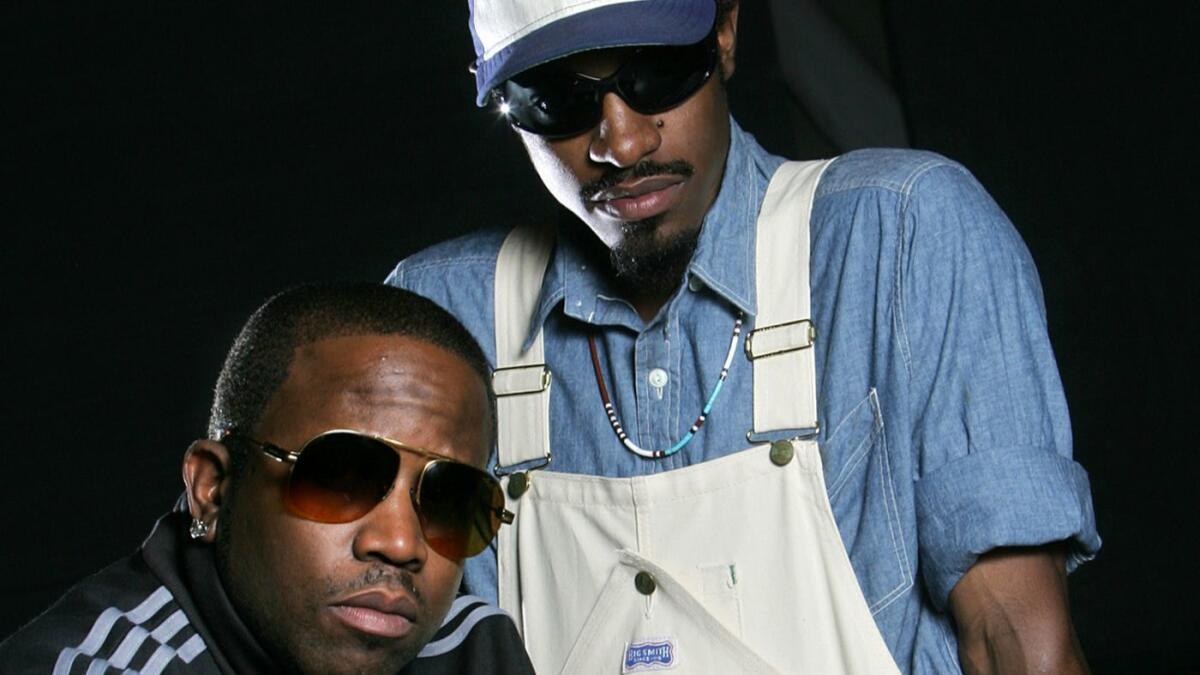
OutKast’s 2003 double-LP achievement was monumental and arguably laid the groundwork for today’s everything-is-hip-hop moment. A pair of No. 1 singles led the way for a head-spinning two hours of pure virtuosity and fun, spanning everything from Southern rap to indie-folk, jazz and prog. It went diamond, and was perhaps the easiest album of the year pick the Grammys ever faced.
SEPTEMBER 2005
Kanye West’s Katrina moment
Thinking out loud with clearly unrehearsed intensity on a network telethon days after Hurricane Katrina, Kanye West delivered the words that now feel like a pivot point in his one-of-a-kind career: “George Bush doesn’t care about black people,” he said, and he hasn’t stopped speaking his mind since.
MARCH 2006
Three 6 Mafia shines at the Oscars
“That’s how you accept an Oscar,” Academy Awards host Jon Stewart proclaimed, and he was right: When Three 6 Mafia won the original song prize for “It’s Hard Out Here for a Pimp,” from Craig Brewer’s film “Hustle & Flow,” the Memphis rappers enlivened Hollywood’s biggest — and often most boring — night with an instant classic of a speech in which they crowded the microphone like they were recording a posse cut and gave an excited shout-out to George Clooney (who had nothing to do with “Hustle & Flow”).
SEPTEMBER 2007
Kanye West versus 50 Cent
In one corner, we had 50 Cent, the heir to Dr. Dre and Eminem, a tough-as-nails MC and the pinnacle of gangsta-rap-gone-pop. In the other corner, the wisecracking upstart Kanye West, whose self-aware lyrics and little-bit-bougie background were backed by a brilliant musical mind. In 2007, they each had new albums, and whichever sold better could claim the throne to the future. In the end, West’s “Graduation” trounced 50 Cent’s “Curtis,” and paved the way for the West-Kardashian world we’re all just living in as spectators.
APRIL 2010
Jay-Z headlines Coachella
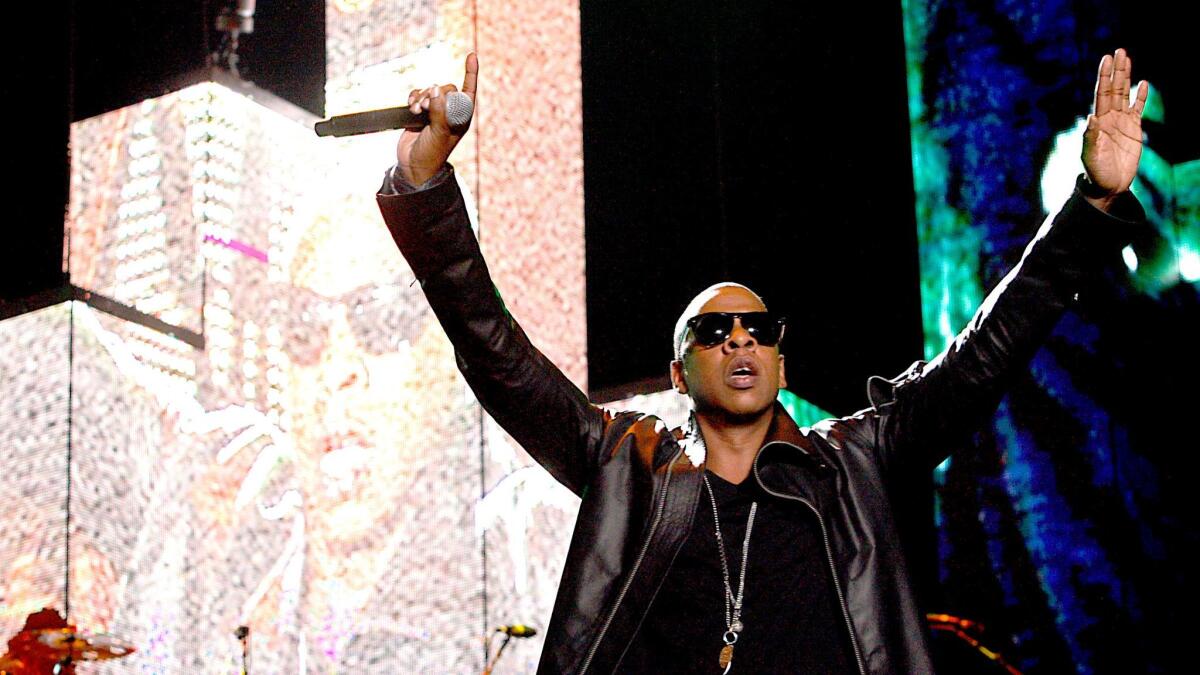
Whatever your feelings about the Coachella Valley Music and Arts Festival’s recent hard pivot into essentially becoming a rap festival — with some EDM and rockers thrown in for spice — when Jay-Z took the main stage in 2010, it was a a sign that change was afoot. Jay’s legacy was well-established, and far from needing the vouch from Goldenvoice. But it was still a bold move and a bet on the sound of Coachella’s future. That is, younger, blacker and more populist. It was a prescient call.
AUGUST 2015
The success of ‘Straight Outta Compton’
Though hip-hop had long been profitable on the big and small screen, it was still quite rare to see a film made about its architects. Then came “Straight Outta Compton.” The long-gestating N.W.A drama not only reinvigorated public interest in the group but it was a box office smash, grossing more than $200 million -- a record for music biopics.
JANUARY 2018
Grammys go hip-hop
With multiple nominations in the major categories — including album, record and song of the year — hip-hop will be visible at this year’s Grammy Awards in a way that finally reflects the genre’s real-world domination. Better late than never.
The biggest entertainment stories
Get our big stories about Hollywood, film, television, music, arts, culture and more right in your inbox as soon as they publish.
You may occasionally receive promotional content from the Los Angeles Times.







